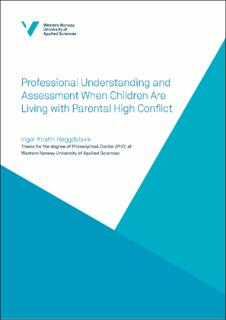| dc.description.abstract | Introduction: This thesis explores how professionals at family counsellor services and child welfare services in Norway understand and assess children at potential risk of care failure when involved in parental high conflict. Enduring parental high conflict presents a significant challenge in terms of assessment and deciding how best to help individual children, parents and families. Studies show that professionals find it challenging and difficult to meet with children, parents and families involved in parental high conflict. Research on such cases at the intersection of family counsellor services and child welfare services is sparse.
Aim: The overall aim of this thesis is to help improve the understanding of and gain knowledge about how professionals understand and assess parental high conflict. The overarching research question is as follows: How do professionals in family counsellor services and child welfare services understand and assess enduring parental high conflict? This research question has been explored in three articles.
Method: The research question has been approached by analysing survey data and focus group interviews. The analyses are mainly qualitative, although there is an element of quantitative analysis in Article I. A qualitative design has been chosen to explore professional discretion and thus gain deeper insight into the understanding and assessment of the risk to children entangled in parental high conflict. Data was gathered through a survey of Norwegian family counsellor services (n=115) and through focus group interviews with a total of twelve participants from family counsellor services and two focus group interviews with a total of twelve participants from child welfare services. The three empirical articles in this thesis approach the overarching research question by exploring and discussing the professionals’ understanding and assessment in the light of different perspectives.
Findings: Article I in this study explored how professionals in Norwegian family counsellor services assess care of the child when the parents are involved in enduring parental high conflict. In the analysis, the following five categories were identified: 1) consequences for the children, 2) competence of the parents as caregivers, 3) participation of the child and the child’s perspective, 4) shared custody and 5) duration and level of conflict. However, the family counsellors’ reasoning differed with regard to their assessments and whether they assessed the risk to the children as high or low. They also differed in their considerations of whether they should report the situation to the child welfare services.
Article II, sought to explore the considerations of Norwegian professional family counsellors when handling parental conflict where children are at risk of maltreatment due to parental conflict. Four themes emerged as potential solutions for family counsellors: 1) expanded efforts in family counsellor services, 2) external low-threshold services, 3) legal proceedings and 4) whether or not to notify to child welfare services. The findings in Article II show that family counsellors are concerned about children involved in parental conflict, but this concern does not necessarily manifest in reporting to the child welfare services. The findings show that the family counsellors prefer to utilise their own services and that of other stakeholders in such situations.
When analysing how the professionals understand and experience parental high conflict in Article III, the following themes were identified: 1) unclear definition of high conflict, 2) conflicting agendas cause stress in the family system, 3) being a professional working with high conflict, and 4) calls for more knowledge and resources, and a transdisciplinary approach. The analysis shows that the professionals seem to be easily entrapped in parents’ conflict-based system, and that feelings of powerlessness and exhaustion often arise when they are trying to help children and parents. Unclear interpretations and understandings of the phenomenon of high conflict also complicate assessments and the ability to help.
The overall findings reveal that professionals show concern for children entangled in parental conflict. It is felt that parental high conflict is difficult to assess, and professionals struggle to take appropriate measures from within their services. The child’s best interest is an overarching principle of family counsellor services and child welfare services, but the different mandates, jurisdictions, analytical perspectives and types of institutional logics affect how children, parents and families are assisted. | en_US |
